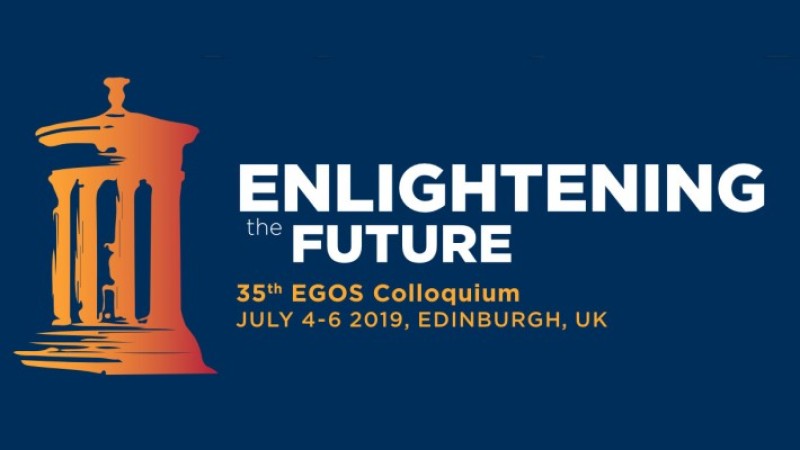PDW 03: Analyzing Qualitative Data in a Communicative Perspective
Call for Applications
Facilitators:
Chantal Benoît-Barné, Université
de Montréal, Canada
Dan Kärreman, Copenhagen Business School, Denmark
Mark
van Vuuren, University of Twente, The Netherlands
Purpose
The general purpose of this PDW – as part
of the EGOS Standing Working Group (SWG) 05 “Organization as Communication” – is to help organization scholars interested
in the connection between communicating and organizing, especially at PhD level and in the early stage of their career, to
refine their analytical skills and to acquire new tools to deal with different types of data. Indeed, few resources exist
that clearly spell out how to conduct data analysis when looking at organizing from a communicative standpoint (exceptions
include Cooren, 2007; Matte & Bencherki, 2019; Meunier & Vásquez, 2008). Traditional qualitative data such as interviews,
documents, or observations, as well as more recent methodological developments using video or photographs (LeBaron et al.,
2017), or considering spatial and aesthetic features of organizations (Beyes, 2017; Cnossen & Bencherki, 2018; Knox et
al., 2008), present many analytical challenges for researchers looking to tease out the role of communication in constituting
organizational phenomena.
PDW 03 will therefore attempt to answer some questions, including:
How can we analyze our data with a fresh, new, or provocative lens?
How can we look at our data in ways that push forward the boundaries of research on organizing, from a communicative perspective?
How can we transcribe the richness and the uniqueness of these data in our academic writing?
By inviting scholars from different methodological
sensitivities but sharing the same concern about doing excellent and creative data analysis in order to write bold and meaningful
academic articles, we want to create a unique opportunity for young scholars who are currently in the process of analyzing
data, to exchange on their challenges and to benefit from the expertise of well-established researchers.
We
welcome various types of data such as:
textual (e.g., archives, emails, reports, blogs, social media, etc.)
audio (e.g., audio recording of interviews, conversations, allocutions, etc.)
visual (e.g., video recordings of meetings, interventions; as well as images, drawings, etc.)
Format
PART I: Panel {30 minutes}: The first part will be dedicated to experts' reflections and experiences on analyzing data such as meeting conversations (Christoph Haug) and videos (Jeanne Mengis). We will end this part with an open discussion between participants and experts.
PART II: Round Tables {2.5 hours}: The participants will present their research project and data, and we will collectively discuss them in a round table format. There will be 3 round tables – each one will be dedicated to a specific source of data. Experienced scholars, including Christoph Haug, Dan Kärreman, Mark van Vuuren and Chantal Benoît-Barné, will chair the round tables and will provide feedback to the participants.
PART III: Plenary Discussion {30 minutes}: The last part of the workshop will be dedicated to an open conversation during which each group shares a key element of their discussion about analyzing qualitative data.
Application
Please submit – via the EGOS website – by April 2, 2019 a single document of application (.doc, .docx or .pdf file) that includes the following information:
Your name, title and affiliation
A 200 words introduction to your empirical data (+ references, if necessary)
A short extract of the raw data, corresponding to either textual, audio or visual data, that you will submit for analysis during the roundtables (translated transcripts + short description of the video or audio file)
A short paragraph (150 words) stating why you are interested in learning about analyzing empirical data based on a communicative perspective
References
- Beyes, T. (2017): “Colour and Organization Studies.” Organization Studies, 38 (10), 1467–1482.
- Cnossen, B., & Bencherki, N. (2018): “The role of space in the emergence and endurance of organizing: How independent workers and material assemblages constitute organizations.” Human Relations, first published on September 18, 2018, https://journals.sagepub.com/doi/abs/10.1177/0018726718794265
- Cooren, F. (ed.) (2007): Interacting and Organizing. Analyses of a Management Meeting. Mahwah, N.J.: Lawrence Erlbaum.
- Knox, H., O’Doherty, D., Vurdubakis, T., & Westrup, C. (2008): “Enacting Airports: Space, Movement and Modes of Ordering.” Organization, 15 (6), 869–888.
- LeBaron, C., Jarzabkowski, P., Pratt, M. G., & Fetzer, G. (2017): “An Introduction to Video Methods in Organizational Research.” Organizational Research Methods, 21 (2), 239–260.
- Matte, F., & Bencherki, N. (2019): “Being Followed by an Organization. A Hauntological Perspective on Organizational Ethnography.” In F. Malbois & F. Cooren (eds.): Methodological and Ontological Principles of Observation and Analysis. Following and Analyzing Things and Beings in Our Everyday World. New York: Routledge, 202–232
- Meunier, D., & Vásquez, C. (2008): “On Shadowing the Hybrid Character of Actions: A Communicational Approach.” Communication Methods and Measures, 2 (3), 167–192.
- Wilhoit, E.D. (2017): “Photo and Video Methods in Organizational and Managerial Communication Research.” Management Communication Quarterly, 31 (3), 447–466.


